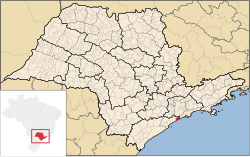Mongaguá
| Mongaguá | |||
|---|---|---|---|
|
|||
 Location in the state of São Paulo and the country of Brazil. |
|||
| Coordinates: 24°05′15″S 46°37′44″W / 24.08750°S 46.62889°WCoordinates: 24°05′15″S 46°37′44″W / 24.08750°S 46.62889°W | |||
| Country | Brazil | ||
| State | São Paulo | ||
| Government | |||
| • Mayor | Artur Parada Prócida | ||
| Area | |||
| • Total | 141.87 km2 (54.78 sq mi) | ||
| Elevation | 8 m (26 ft) | ||
| Population (2015) | |||
| • Total | 52,492 | ||
| • Density | 370/km2 (960/sq mi) | ||
| Time zone | BRT (UTC-3) | ||
| • Summer (DST) | BRST (UTC-2) | ||
| Website | Mongagua.sp.gov.br | ||
Mongaguá is a municipality in the state of São Paulo in Brazil. It is part of the Metropolitan Region of Baixada Santista. The population is 52,492 (2015 est.) in an area of 141.87 km². The name comes from the Tupi language. Its seal carries the national motto of the United States of America, E pluribus unum.
The municipality's street plan is on a planned grid running from SSE to NNW and many of the houses are within sight of the Atlantic Ocean. The populated area of Mongaguá is near the bottom of steep-sloping and densely forested mountains. The BR-101 superhighway linking Santos and the southern part of the state runs through Mongaguá. The freeway to the city of São Paulo is also easily accessible. Housing developments near the beaches were built in the 1970s and the 1990s. Prior to the construction of the housing developments, the population was mainly rural. Housing development continues to this day.
There are two aboriginal villages in Mongaguá: Itaoca and Aguapéu, located in the Atlantic Mata reserve. The aboriginal community of Aguapéu conceived of the project Jaguatareí Nhemboé (Walking and Learning).
...
Wikipedia


